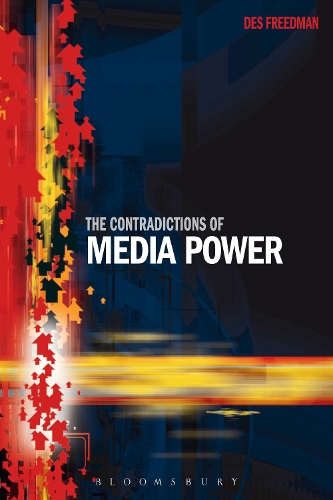
The Contradictions of Media Power
(Paperback)
Available Formats
Publishing Details
The Contradictions of Media Power
By (Author) Dr. Des Freedman
Bloomsbury Publishing PLC
Bloomsbury Academic
25th September 2014
United Kingdom
Classifications
Tertiary Education
Non Fiction
Media studies
Human rights, civil rights
Political science and theory
Media, entertainment, information and communication industries
302.23
Physical Properties
Paperback
192
Width 156mm, Height 234mm
304g
Description
Media power is a crucial, although often taken for granted, concept. We assume, for example, that the media are 'powerful'; if they were not, why would there be so many controversies over the regulation, control and impact of communicative institutions and processes Further, we assume that this 'power' is somehow problematic; audiences are often treated as highly susceptible to media influence and too much 'power' in the hands of one organization or individual is seen as risky and potentially dangerous. These concerns have been at the heart of recent controversies involving the relationships between media moguls and political elites, the consequences of phone hacking in the UK, and the emerging influence of social media as vital gatekeepers. Yet it is still not clear what we mean by media power or how effective it is. This book evaluates contrasting definitions of media power and looks at the key sites in which power is negotiated, concentrated and resisted - politically, technologically and economically. Combining an evaluation of both previous literature and new research, the book seeks to establish an understanding of media power which does justice to the complexities and contradictions of the contemporary social world. It will be important reading for undergraduates, postgraduates, researchers and activists alike.
Reviews
Over the past decade Des Freedman has established himself as one of the preeminent media scholars in the world. The Contradictions of Media Power is his finest work to date, demonstrating Freedman's superior command of political and social theory. Each page bristles with keen and original insights. The book is absolutely mandatory reading for anyone seeking a critical analysis of media and society. * Robert W. McChesney, Professor of Communication, University of Illinois at Urbana-Champaign, USA, and author of Digital Disconnect *
Des Freedman provides a much needed boost to radical approaches to power with this highly sophisticated and interrogation of the workings of media power. This book is simply the best version of the political economy reading of media power that we have. It faces head on how the economic power vested in media institutions is being reconstituted in the age of social media, while occasionally generating media products that make powerful critiques of the very processes of capitalism that produced them. * Nick Couldry, Professor of Media, Communications and Social Theory, London School of Economics and Political Science, UK *
Des Freedmans book offers a critical, dialectical, analysis of media power which links this to the possibilities for resistance and fightback. This book is expansive in its range, covering issues such as ownership, net neutrality, press freedom, and digital switchover. -- Lindy Syson * Counterfire *
Freedman brilliantly tackles the central issue concerning the media in modern life: their power. He is critical but never simplistic, rigorous without being pedantic, and passionate without ever sacrificing intellectual depth. * David Hesmondhalgh, Professor of Media and Music Industries, University of Leeds, UK *
Des Freedman is among the worlds leading analysts of media power. Always cogent, always scholarly, and always lively, his work takes us into the grubbiest corners and cleanses them with brilliant illumination. * Toby Miller, Sir Walter Murdoch Professor of Cultural Policy Studies, Murdoch University, Australia, and Professor of Journalism, Media and Cultural Studies, Cardiff University, UK *
Author Bio
Des Freedman is a Professor of Media and Communications at Goldsmiths, University of London. He is the author of The Politics of Media Policy, co-author (with James Curran and Natalie Fenton) of Misunderstanding the Internet, co-editor (with Michael Bailey) of The Assault on Universities: A Manifesto for Resistance and co-editor (with Daya Thussu) of Media and Terrorism: Global Perspectives. He is particularly interested in issues of media power and media reform. He is the chair of the UK Media Reform Coalition and on the national council of the Campaign for Press and Broadcasting Freedom. He is an editor of the journal Global Media and Communication and a member of the Goldsmiths Leverhulme Media Research Centre.
